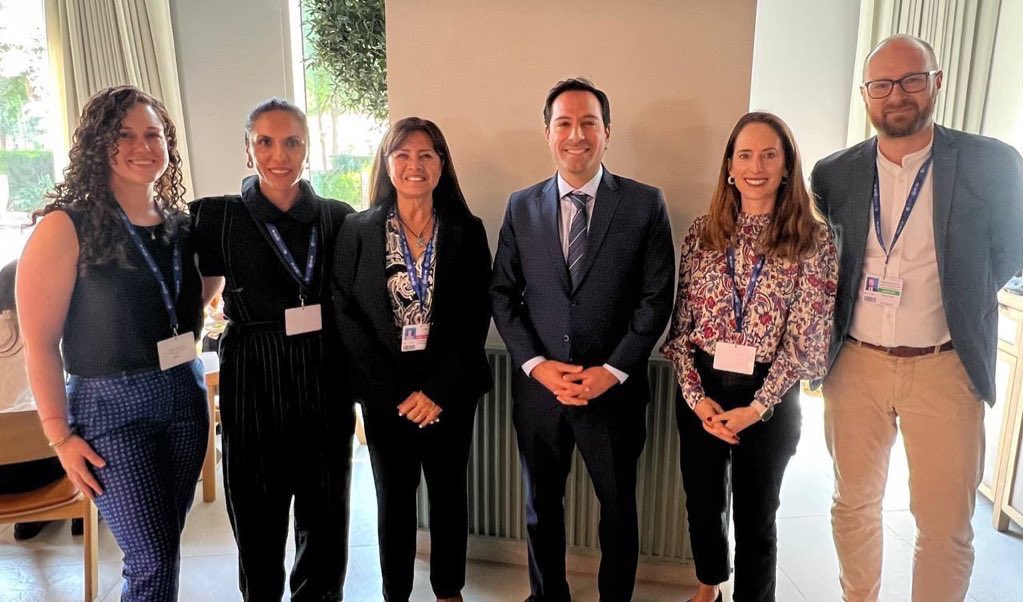Mexico’s Regional Efforts Against Climate Change
In the heart of Mexico, state-level initiatives are a beacon of hope in the fight against climate change. The Governors’ Climate & Forests Task Force (GCF Task Force) in Mexico is leading the charge, showcasing the vital role of local governance, community involvement, and technological innovation in crafting sustainable futures. Our local partners from Pronatura Sur, led by Silvia Llamas, highlight significant strides made in Oaxaca, Chiapas, and across other Mexican states, underscoring a commitment to environmental stewardship that deserves national and international attention.
 Technological Triumphs in Chiapas and Oaxaca
Technological Triumphs in Chiapas and Oaxaca
October brought to light the collaborative efforts between Chiapas and Oaxaca in harnessing technology to combat climate change. The development of geospatial tools and the creation of a “Climate Change Resilience Map” and “Environmental Logbook” are pivotal in the Monitoring, Reporting, and Verification (MRV) processes. These tools are crucial for informed decision-making, allowing for a more nuanced understanding of land use impacts and the effectiveness of conservation efforts. Such technological advancements are setting new standards in the management and conservation of forest resources and ecosystems.
Oaxaca’s Green Revolution: The “Tierra de Agaves” Project
November’s spotlight shone brightly on Oaxaca’s “Tierra de Agaves” initiative, a pioneering project that marries the preservation of landscapes with the promotion of sustainable agricultural practices within the agave-mezcal value chain. This initiative is not just about environmental conservation; it’s a model for economic development that respects the balance with nature. It stands as a testament to the power of collaboration, involving a wide range of stakeholders from government bodies to civil society organizations, all working together to combat deforestation and promote biodiversity. Crucially, it rests on three pillars: the Legal and Regulatory Framework, ensuring laws and regulations support deforestation prevention and sustainable agave cultivation; Biodiversity Conservation and Sustainable Production, applying landscape restoration and protection models using both existing conservation tools and innovative agroecological restoration strategies; and Sustainability in the Agave-Mezcal Value Chain, working directly with the industry to enhance production practices and minimize environmental impact, addressing issues such as waste management and the use of legally sourced firewood.
In preparation for COP 28, in Dubai, the GCF Task Force Mexico representatives held a meeting where delegates and governors concentrated on structuring GCF operations and enhancing leadership for better network performance. They reviewed efforts for acquiring resources vital to combat deforestation. The session also realigned the Executive and Regional Committees of Indigenous Peoples and Local Communities (CPICL), leading to the election of new representatives. Furthermore, they discussed updating deforestation data and equipping technical teams for environmental tasks. A key focus was the New Forest Economy’s financing, which preceded its introduction at COP28 in Dubai.
Indigenous Peoples and Local Communities: Partners in Conservation
At the intense COP schedule the announcement of a new initiative to bolster community forestry management highlighted the indispensable role of Indigenous Peoples and Local Communities (IPLCs) in conservation efforts. This move underscores a growing recognition of the value of traditional knowledge and practices in environmental policy-making. By increasing IPLC participation, Mexico is paving the way for more inclusive, effective conservation strategies that respect cultural heritage and biodiversity alike.
It is worth highlighting the Yucatán Governor Mauricio Vila’s quote in the occasion of the GCF’s Call to Action during COP 28:
“Today we need to act and stop planning, this is the best time to have this conversation, especially because it allows us to discuss the actions we are taking to build sustainable regions. I am grateful to the GCFTFfor inviting me and I am very pleased to be here to talk about how to implement and complement the actions that we are already undertaking in Yucatán, Mexico.”
A Milestone Announcement: Carbon Sequestration Incentives
Perhaps the most significant announcement came in December, with the launch of a state-level program designed to incentivize carbon sequestration projects. This ambitious initiative not only aims to reduce emissions but also to establish Mexico as a frontrunner in climate change mitigation and biodiversity conservation. It represents a critical step forward in the global effort to address climate change, offering a replicable model for other nations to follow.
The actions taken by the Mexican states within the GCF Task Force exemplify the critical role of local governance, community involvement, and technological innovation in the global fight against climate change. These initiatives, from Oaxaca’s “Tierra de Agaves” project to the technological advancements in Chiapas and the new carbon sequestration program, highlight a comprehensive approach to environmental conservation. They remind us of the importance of collaboration, the value of traditional knowledge, and the potential of technology in crafting a sustainable future.
As we look towards the future, let these initiatives inspire further action and collaboration. It’s a collective call to support these efforts, stay informed, and contribute to a more sustainable and equitable world. Together, we can turn the tide against climate change and pave the way for a greener, more resilient planet. Don’t forget to subscribe to Pronatura Sur’s newsletter to hear it firsthand of the amazing work being done there.

